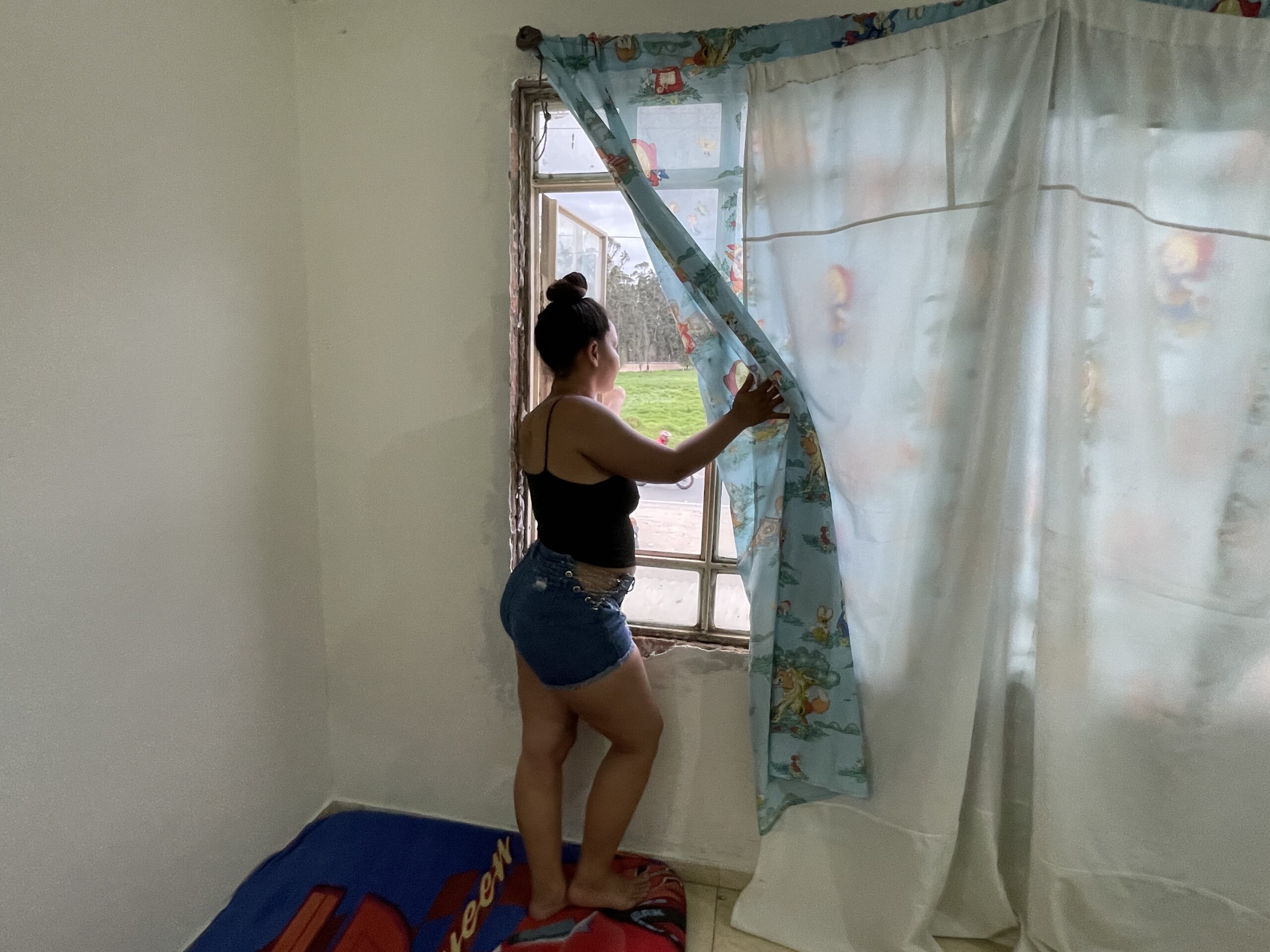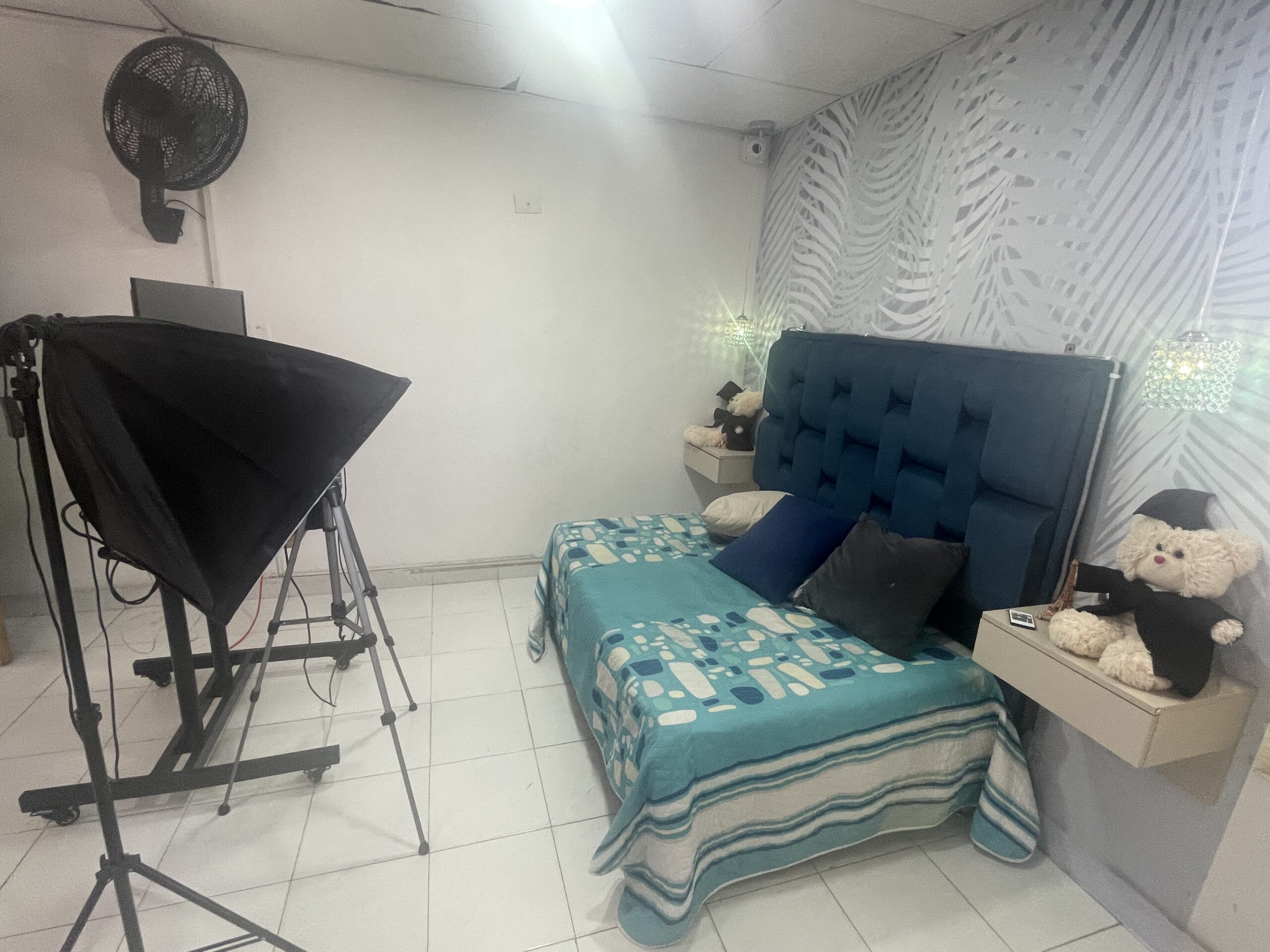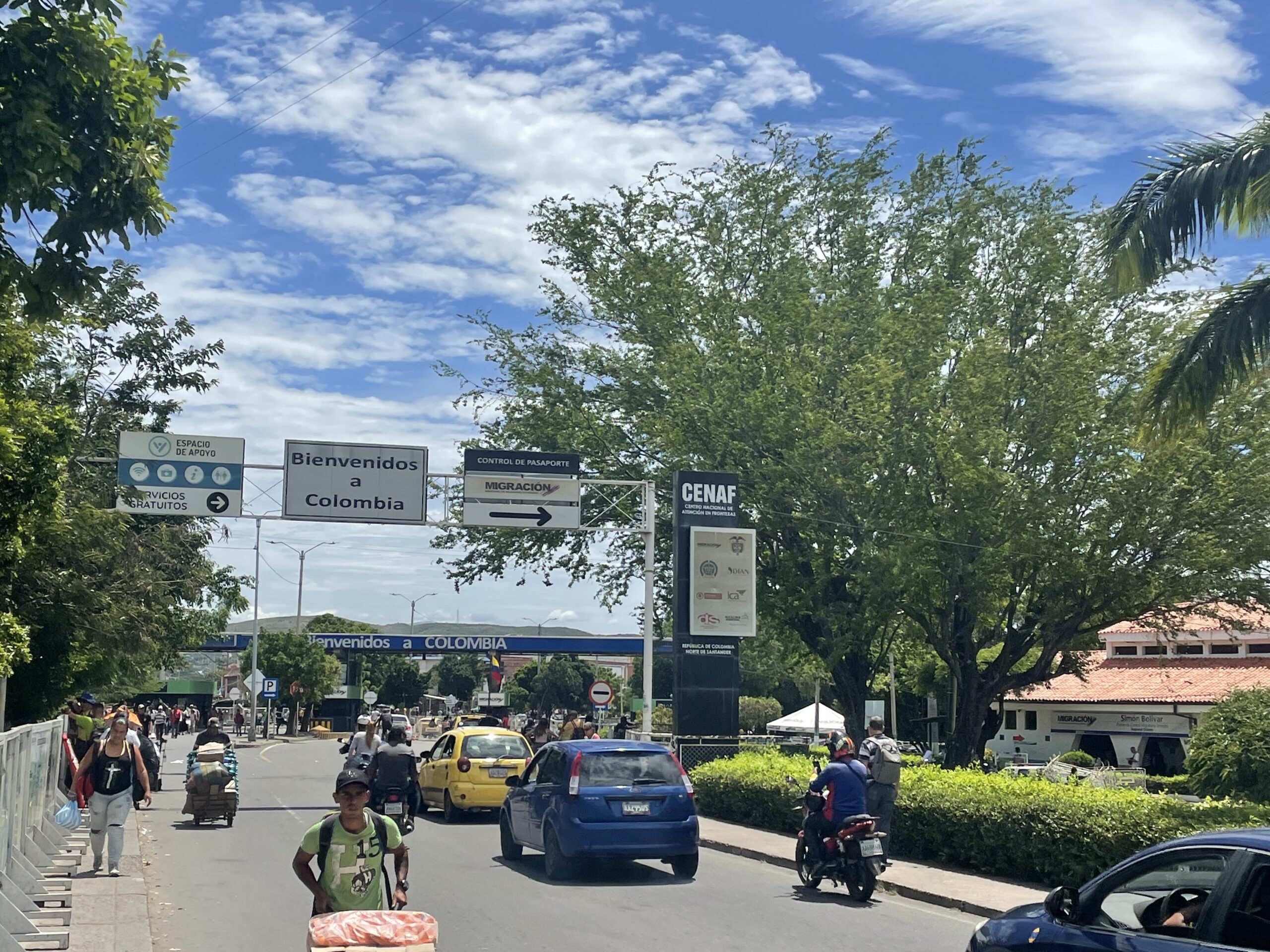
Despite risks, camgirl work provides lifeline for migrant Venezuelan women
By Catherine Ellis, for CNN
Cúcuta, Colombia — Not long after Valeria had arrived in Colombia, her dad noticed she was online late at night and sent her a message from Venezuela, asking why she was still awake.
The 20-year-old had to think fast as she had told her family she was moving to the neighboring country to work in a call center.
“I told him I’d found a second job in a grocery store,” she told CNN.
But both jobs were lies.
Valeria, whose name has been changed to avoid stigma, was in the middle of her shift as a model in a house-turned-webcam-studio in the Colombian border city of Cúcuta, performing erotic shows for online clients around the world.
“For the first month it was so hard to do. I felt terribly ashamed,” she says, with her hands clasped in her lap, as the sound of taxi horns and the shouts of a man selling avocados outside pierce through the large open window.
“But I told myself I couldn’t leave,” she recalls. “I don’t really like the work much. But I do it, because I need to.”
Valeria is one of tens of thousands of Venezuelan women working as models in Colombia’s many webcam houses, where they receive a salary and accommodation in return for their performances online, streaming mostly to clients in Europe and North America.
The houses are usually in residential areas where they appear typical from the outside, but inside have been converted into make-shift studios with lights, cameras and sex toys in abundance.
The adult webcam industry itself isn’t new in Colombia, with some studios thought to have opened in the early 2000s, but the ongoing economic crisis in Venezuela, exacerbated by the Covid-19 pandemic, sparked the emergence of a patchwork of small, informal webcam houses across Colombia, particularly in border areas where they offer migrants a wage and a place to live.

A Colombian soldier stands guard at the Simon Bolivar International Bridge in the border between Colombia and Venezuela in Cúcuta, Colombia, on November 9, 2022. Schneyder Mendoza/AFP/Getty Images
A 2022 study estimated that in the border cities of Cúcuta and Villa Rosario alone, there were between 800 and 1,000 webcam houses hosting an estimated 11,700 migrants across them, the majority of whom are Venezuelan. The number of these houses could now be as high as 3,000, according to César García, coordinator of the North Santander region at Aid for Aids Colombia, the NGO focused on HIV prevention among Colombian and migrant populations which conducted the study.
Valeria was studying engineering in Venezuela before she arrived in Cúcuta at the start of 2023 to be what she called a camgirl. With her family struggling to eat, she said she made the decision to leave for Colombia so she could afford to live and save enough money to one day return home and continue to her studies.
“For people in Venezuela it’s prostitution,” she says, despite the fact she models remotely for clients. Prejudice towards the webcam industry exists in both countries, according to Valeria and multiple other models CNN spoke with. However, in Colombia it’s generally more accepted.
“Here in Colombia, it’s very normal,” Valeria says.
‘No one is coming from Venezuela to work in a ‘normal’ job’
The webcam modeling community in Colombia largely employs women. CNN visited three cam houses (one illegal and two legal), where between four and 12 people were living and working. All the models stayed in shared rooms and played a part in chores, such as keeping communal areas clean, and they had community rules to live by.
Webcam modeling is legal in Colombia, as long as models are at least 18 years old and participating in the work of their own free will. To be considered legal, webcam businesses –?like all businesses?–?have to fulfill several requirements, including registering with the local chamber of commerce, paying taxes, providing employment contracts, and upholding health and safety regulations. Businesses that fail to do so are considered illegal.
Jorge Montoya is the owner of a registered studio, JH studios. He accuses some “garage studios”?–?what he calls the illicit webcam houses?–?of engaging in unethical practices, including poor working environments, not giving models payments agreed and?other abuses of power. The models CNN spoke to who have worked in illicit houses confirmed this.
In webcam houses, the models – working alone or in groups – perform for online users in public shows, where they are given digital tokens with a monetary value, or in private shows where they are paid by the minute. In both cases, money is typically transferred weekly to a bank account, usually that of the webcam house owner, and a percentage is given to the models in cash.
Generally, the women CNN spoke to said they get to keep 40-60 percent of what they make online. Seven women said they could earn up to $250 US per week on average – more than three times Colombia’s national minimum wage. Earnings can be considerably higher depending on the site, the model, how new they are to the industry, and what they are prepared to do on camera. They all said the income is what keeps them in this line of work.
“These days almost no one is coming from Venezuela to work in a ‘normal’ job,” Valeria says. “A restaurant, in a clothes shop; they’re not going to pay well… they come directly to the webcam world.”

Most rooms used for webcam shows are kitted out with a bed or sofa, camera and lights. Catherine Ellis
César Garcia at Aid for Aids – which provides sexual health screening programs – tells CNN that although he knew that the adult webcam world existed, he and his team were surprised when they realized the number of Venezuelans actively choosing this work because of a lack of other options.
“We found that this population didn’t have an alternative. Venezuelan women arriving to Colombia don’t automatically have the right to work or to certain services and have to apply for permits that give them these rights, which can take time,” he tells CNN in his office. “They went to search for a solution from the state and they didn’t find it. They went to the webcam houses and the doors were opened.”
In 2021, then Colombian President Ivan Duque Márquez introduced Temporary Protection Status (TPS) for Venezuelans, granting them the right to live and work legally in Colombia for ten years, along with access to healthcare and education. This initiative received praise from Venezuelan migrants, civil society organizations, and governments worldwide.
But the challenges and delays in obtaining these permits has led some women to turn to other options for work, like webcam houses?–?particularly illicit ones?–?where permits aren’t typically requested. Even when they have these permits this doesn’t always translate to better employment or wages. Some migrant women CNN spoke to had been waiting more than a year for their permit, and one woman who received it continued to struggle to find a job that provided a livable wage.
Young women like Valeria don’t want to be put in that position.
Escaping economic collapse
As a young mum in Venezuela’s capital, Caracas, Erika, was in a precarious situation.
“A basic salary really wasn’t enough,” the 25-year-old remembers, explaining that although she had a job as a kitchen assistant, she couldn’t afford basic groceries, and supermarket shelves were “becoming more sparse.”
“When we ate, it was only once a day,” she recalls. “I didn’t want to come [to Colombia] as my son was very small, but out of necessity I had to come,” she tells CNN, sitting on a pale gray sofa in a webcam house in?Cúcuta,?drinking a glass of cola.
Her home country was once thriving. With the world’s biggest oil reserves, Venezuela?had a booming economy. But starting in 2014, falling global oil prices triggered an economic crisis. President Nicolás Maduro responded with political oppression, and economic mismanagement and corruption led to a humanitarian disaster that has plagued the country with food insecurity, poverty and inequality for years. The already dire situation has been aggravated by economic sanctions imposed by the US.
Women were – and still are – particularly hard hit by Venezuela’s economic collapse. They were major beneficiaries of the socialist government’s social and health programs that began under former President Hugo Chávez, such as monthly cash incomes to poor mothers and mother-infant nourishment programs. But during the catastrophic economic downfall, these funds dried up.
The crisis has pushed almost eight million Venezuelans – about a quarter of the population – to leave the country since 2015. Almost three million of them are in Colombia.

A group of migrants arrive at the support center of Aid for Aids in Cúcuta. Lucas Molet
When Erika set off for Colombia from Caracas in 2018, she believed she was going to a job as a housekeeper, arranged by a family member. Instead, she found herself in a room with other women, a computer and a camera.
“I was frozen. I didn’t know what to do,” she explains, raising her voice slightly to drown out the buzzing of the small fan nearby.
Still, she says her decision to stay is one that she doesn’t regret, and one which she stresses was her decision alone. “[Webcam work] changed my life completely. I saw that my son had diapers, clothes, daily food, and his school. He had everything a mother wants for their child.”
Like Erika, some models who chose to work in the industry say there are parts of their jobs that they genuinely enjoy: dancing, chatting to people from around the world and practicing their English. Some models can also choose how to spend their earnings, whether helping their family, using it for bus fares to other cities, saving it for the future, or enjoying simple things they couldn’t afford in Venezuela, such as ordering pizza or taking taxis.
‘In Venezuela, when we ate, it was only once a day. Out of necessity, I had to come.'
“There are good and bad things about the job,” Valeria says. “You learn a lot, you open your mind and learn many more things, like self-confidence.”
For others CNN spoke to, this is not work that they want to do, so there’s little enjoyment in their day. The work is simply a stepping stone to some financial security.
The precarious situation for migrants in Colombia can also leave women vulnerable to sex trafficking, where they are forced, tricked and coerced into the industry, and are often unable to leave as their passports are confiscated, or they are threatened.
From approaching newly arrived women at border entry points, to chatting to them in restaurants or on buses, and targeting them on social media, criminal and armed groups use various tactics to recruit women into modelling in the more illicit and exploitative setups, explains a Trafficking in Persons report by the US State Department. Many think they are going to work in hotels, or to work as regular models and find themselves in front of a camera, like Erika, or often asked to perform sexual acts in person.
The goal is a secure future
On the outskirts of Cúcuta, Ana?–?whose name has been changed to protect her identity – sits on the spacious terrace of a large house with views of vibrant green hills. She’s about to start a night shift at one of the city’s professional webcam studios.
“I don’t earn badly, and it gives me a base to save. I’m saving and saving. I always have a goal.”
Like other camgirls, Ana lives at the studio with other women, but she also owns two properties: an apartment bought with the money earned at her current studio and a house purchased with her income from a previous job at an illicit webcam house. She now hopes to buy a car, she says.

Many Venezuelans crossing to Colombia by land first enter the border city of Cúcuta. Catherine Ellis
The plan is to secure her future. Once she has saved enough money, she plans to leave the webcam world behind to achieve her main goal of starting a business. “Perhaps a beauty salon or a restaurant,” she says.
Valeria has similar dreams and is optimistic that at some point she’ll return to Venezuela to continue her studies. “No one is here out of obligation because the day they want to leave, they leave,” she says. “They are here because they need to be.”
For the women who feel less free, and vulnerable to exploitation in illegal webcam houses,?Montoya who owns a registered cam house,?says he wants a better regulated industry. “I want us to have a code that we all operate under and that all of us pay taxes and we are standardized,” he tells CNN.
This is something that the Colombian government has said it is looking into due to a Constitutional Court ruling in 2021 recognizing the labor rights of webcam models and to also combat tax evasion.
In the meantime, Venezuelan women continue to enter Colombia – and the webcam sex industry.
Top image caption: Webcam model Erika set off for Colombia from Caracas, Venezuela in 2018, believing she was going to a job as a housekeeper. Instead, she found herself working in the adult webcam industry. Credit: Catherine Ellis.